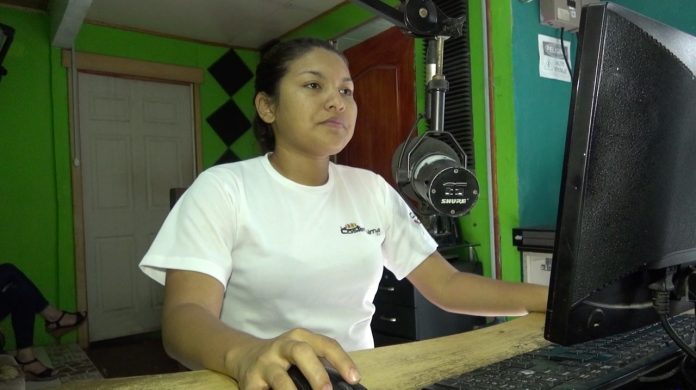26 de septiembre 2020

Children of Exile: The Births “Sowing Hope” in the Camp of Nicaraguan Farmers

PUBLICIDAD 1M
PUBLICIDAD 4D
PUBLICIDAD 5D
The press director of the Bluefields radio station “La Costenisima” was found guilty of slander. Her accusers are civil servants that work for the FSLN

Kalua Salazar director of the Bluefields radio station “La Costenisima” was found guilty of slander. Her accusers are civil servants that work for the FSLN
Judge Deyanira Trana, presiding judge of the Bluefields Criminal Court, declared journalist Kalua Salazar “Guilty” of slander. The verdict came Wednesday morning, September 23rd. Salazar is press director of the radio station “La Costeñísima”, on Nicaragua’s mid-Atlantic coast. The slander accusation refers to a podcast on “Corruption uncovered in the El Rama City Hall.”
“The ‘guilty’ verdict was read (..) We’ll wait for the sentence, then use our right to request an appeal.” This was the reaction of Boanerges Fornos, Salazar’s defense lawyer, during an interview with Noticias de Bluefields [Bluefields News].
The crime is penalized by a fine, whose amount can vary greatly. The lawyer for the prosecution, Denis Baez, requested that the sentence contemplate the maximum possible penalty. The three accusers all claim they were the “victims” of slander.
“The sanction here is a payment of fines, calculated in cost per day.” “The prosecution has argued that it took place in the media. Hence, they asked for a sanction [on the high end of the scale]. As a defense, we’re asking for the minimum sanction,” Fornos explained.
Kalua Salazar’s lawyer also asserted that there were flaws in the trial and presentation of evidence. “The facts they were disputing weren’t proven. Nor did they prove that a criminal act was committed.”
Upon leaving the Bluefields Judicial Complex, Salazar said she considers the guilty verdict “unjust”. She reiterated that the only thing those in the station did is “open the microphones to citizens’ complaints.”
“To me, this is unjust. As a media outlet, we’ve opened our microphones to many people who want to make a public denunciation. (…) They then accuse me, as if we at La Costenisima said these things. They assert that we mentioned it, but it wasn’t on the part of La Costenisima,” she stated.
Salazar also warned that the effect of this type of sentence is to “criminalize” independent journalism. Nonetheless, she stressed that the station will continue their policy of open microphones. These will remain a resource for anyone who wishes to publicly denounce the human rights abuses committed in the country.
The legal persecution of independent journalists has intensified in the past six months. Journalists David Quintana from Boletin Ecologico, William Aragon, and Elsa Espinoza are among other reporters who currently face legal battles. The three also face charges of “slander and falsehoods”. The accusations stem from their denunciations of the arbitrary abuses of the regime and its functionaries.
Nicaragua’s Independent Press Forum (PCIN) has also denounced recent attacks on press freedom. The group sees this as a “coordinated offensive on the part of the regime’s repressive forces”. The actions are “orchestrated by people close to the regime. The intention is to silence the voices of the independent communications media.”
This type of accusation, PCIN notes, is part of the regime’s strategy of “legal harassment”. “It represents a means of censorship, intimidation, and criminalization of journalism, within the government strategy of repressing freedom in Nicaragua.”
Archivado como:
PUBLICIDAD 3M
PUBLICIDAD 3D